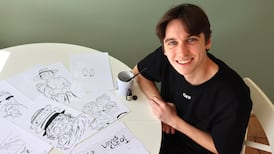The value of friendship is something that coasts along with the various good times in life, but it truly reveals itself during the bad times. We all hit our rocky patches and our lulls and that’s when we need our friends to support us.

The rocky patches, however, crop up more often for people living with disabilities – sometimes quite literally – and that’s when we need our friends to know how to support us and be our ally.
Allyship is a wonderful thing because it’s not just stepping up to your duties as a friend, it’s a promise to make sure that if we’re ever excluded from society, we can work together and prevent it from happening to someone else.
I recently started volunteering with Shout Out, the LGBT+ organisation that visits schools and workplaces for educational workshops. On my first excursion to a secondary school in Kildare, I had to tell my story and explain why I was there.
As I introduced myself, I mentioned that I was from a rival town in Kildare – a joke that was meant to lighten the mood but did nothing of the sort – and that I was also an ally to the LGBT+ community.
In my role as an ally, I am not just a friend but I am a supporter of my friends, no matter what their sexual orientation or gender identity is.
Having lived my whole life with a disability, I told the students that I knew what it was like, as a wheelchair user, to be discriminated against and made fun of as a child and as an adult.
Human rights issue
I experienced first hand what it was like to not just feel unwelcome somewhere because of who I am but to also feel worthless as a result of the backward lens that some people see disability through. Knowing this, I knew I had to be an ally so that my friends know that they’re not alone, in the good times or the bad.
All throughout the build-up for 2015’s marriage referendum, we saw the importance of allyship. This wasn’t just an LGBT+ issue but it was a human rights issue for the people in our lives and the strangers we’ll never meet.
When it comes to making changes – either big, legal ones or small things like learning to listen instead of always talking – we need people to come together and work towards a better society.
As has been outlined time and time again in this series, disabled people face daily discrimination. Whether it’s a lack of access to employment, education and nightclubs, harassment on the street or patronising comments from people who mean well, discrimination is a constant presence in our lives and we can’t keep fighting this fight alone.
We need our allies.
The easiest way to be an ally for disabled people is to actually listen to their experiences. To see the world through their eyes and take action. You can start small by actually finding out what the access facilities in restaurants and holiday homes are like, rather than treating your friend like Google and getting them to do all of the research alone.
It’s amazing how something like that can actually make you feel included in your friend group, that your needs aren’t this extra burden or extra cost to having you involved.
Isolated
You can change how other people view disability by correcting them if they used outdated or insulting words like retard or wheelchair-bound. You’d be surprised how many supposedly liberal people throw those words about as if they mean nothing.
If you’re a bit of a high flyer, maybe you can use your sway so that disabled people can actually get into protected buildings? That would be swell.
When non-disabled people find out that access isn’t a requirement for all buildings and that we still get name called and isolated, the response is usually: “It’s 2019! Surely, that’s not the case”.
Well, we are fully aware that it is 2019 and, to everyone’s surprise but our own, disabled people are still fighting for the same rights that we’ve been fighting for our whole lives.
We need our friends to do more and become our allies because disability rights are human rights and we can’t be the only ones to recognise this.
Platform Series - Louise Bruton
1) Sexual health
2) Day I started using a wheelchair
3) 'Wheelchair-friendly' rooms
4) Please don't ask me
5) 'Inspiration'
6) Asking for help
7) Things you learn in a wheelchair
8) Sex and disability in the spotlight
9) I spend much of my time waiting
10) People with disabilities need allies











